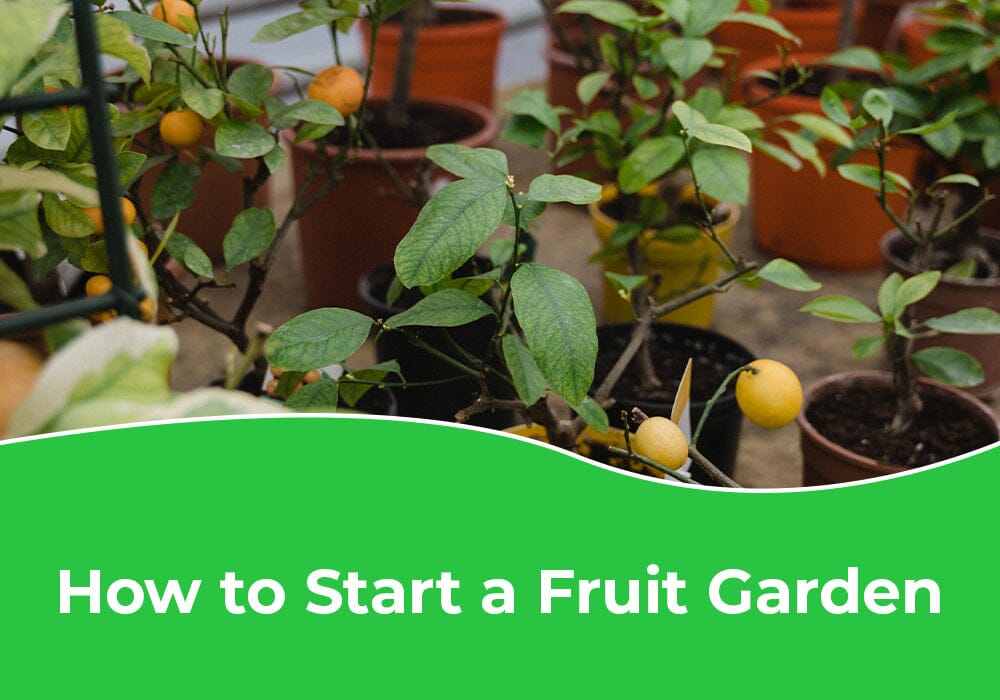
How to Start a Fruit Garden
Share

Are you looking to give your backyard a perfect green cover by planting trees? Since, there are different types of plants available to choose from, it won’t be much difficult for you to do it. However, it would surely be a wonderful deal if you grow some tropical fruits in your backyards. Yes, this is completely possible and you can easily have a beautiful fruit garden.
Is it possible for fruits to grow in a garden?

Yes, this can be done if you follow strict guidelines and the local atmosphere is favorable for their growth. There are different types of tropical fruit trees for sale available both online and offline which means you can easily have a garden full of delicious fruits that you can enjoy at any time. By maintaining a perfect balance of timing, planning, and upkeep, you can achieve your dream of having a beautiful fruit garden in your backyard or garden. This would help you get a fabulous fruit harvest you would love to boast. Here are some important tips you can follow to get the best outcomes.
- Soil Composition and pH
The first thing to do is to add compost and organic matter that would enhance the overall quality of your garden soil. Fruit trees, plants, and shrubs are found to grow best in soil that is nutrient-rich and well-draining.
The appropriate acidity level for various fruit species might fluctuate greatly with respect to pH. It is essential to test your soil and examine your plants to determine their specific pH requirements. Plants with suitable pH values should be together, and the soil in each bed should be amended to meet the needs of the individual plants.
- Sunlight and Shade
In order to get the best results from a fruit garden, it is recommended to choose a garden spot in your yard that gets a minimum of six hours of sunshine. If you have shadier areas of your yard that only get partial sun, grow fruits that can withstand such circumstances there, like rhubarb, plums, currants, kiwis, and pears.
- Choose The Fruit Varieties To Grow

To ensure the sustainability of your fruit garden, it is better to pick a variety of annual and perennial varieties. Instead of choosing all of the fruits in your garden at once, get to know the fruit harvest seasons and plan the fruit trees accordingly. Pick an even distribution of early, mid-season, and late-season cultivars.
Depending on your grow zone, watermelons, strawberries, kiwis, cantaloupe, pineapple, grapevines, kumquats, oranges, raspberries, lemons, limes, blackberries, and blueberries, as well as pear, peach, cherry, apple, and mango trees are all fabulous for your fruit garden. You can choose from a wide range of tropical fruit trees for sale because there are several variations within each category.
- Choose From A Combination of Fruit-bearing Annuals and Perennials
A key component of making your garden a perpetually fruit-bearing sanctuary is to take into account perennial fruit growers. Long-lived perennial plants grow back stronger each year to yield larger harvests. A whole growing season is needed to complete annual plantings. Here are several good reasons to plant perennial fruit trees in your yard along with the trendier annual fruit-bearing plants.
- You can get a good harvest by choosing perennial plants. In a garden, perennials are the first plants to emerge, give a crop, and produce fruits for longer periods as compared to annuals.
- Growing perennial plants doesn’t need much effort. They don't need to be planted and cared for a year. By giving easy care, you can make them grow.
- Perennials need significantly less water than annuals do as their roots go deeper into the ground every year.
- Because they have deeper root systems than annuals, they can more effectively take beneficial nutrients from the soil. By transporting these nutrients closer to the Earth's surface, they also help their yearly garden partners.
- Perennial plants help to make the soil more stable. A perennial plant replicates nature by annually dying back and releasing valuable nutrients into the soil. The roots that do not erode aid in preventing erosion in the garden.
- Add Mulch
Mulch may benefit your fruit garden in a few different ways. The first benefit of mulching is that it keeps the soil around fruit trees and in garden beds wet. It also aids in the fight against weeds, which can rob fruit trees of their necessary nutrients and water to survive. To assist guarantee that your fruit trees, shrubs, and plants receive enough essential water and nutrients, incorporate mulching into your routine for maintaining a fruit garden.
- Watering
Enough water must be provided to plants, shrubs, and trees during the growing season to get the best produce.In areas that remain flooded, fruit-bearing plants and trees will not flourish as expected. In extremely arid conditions, fruit trees won’t flourish. Consider building a drip irrigation system if your yard is dry or if you won't be able to routinely water your fruit patch.

